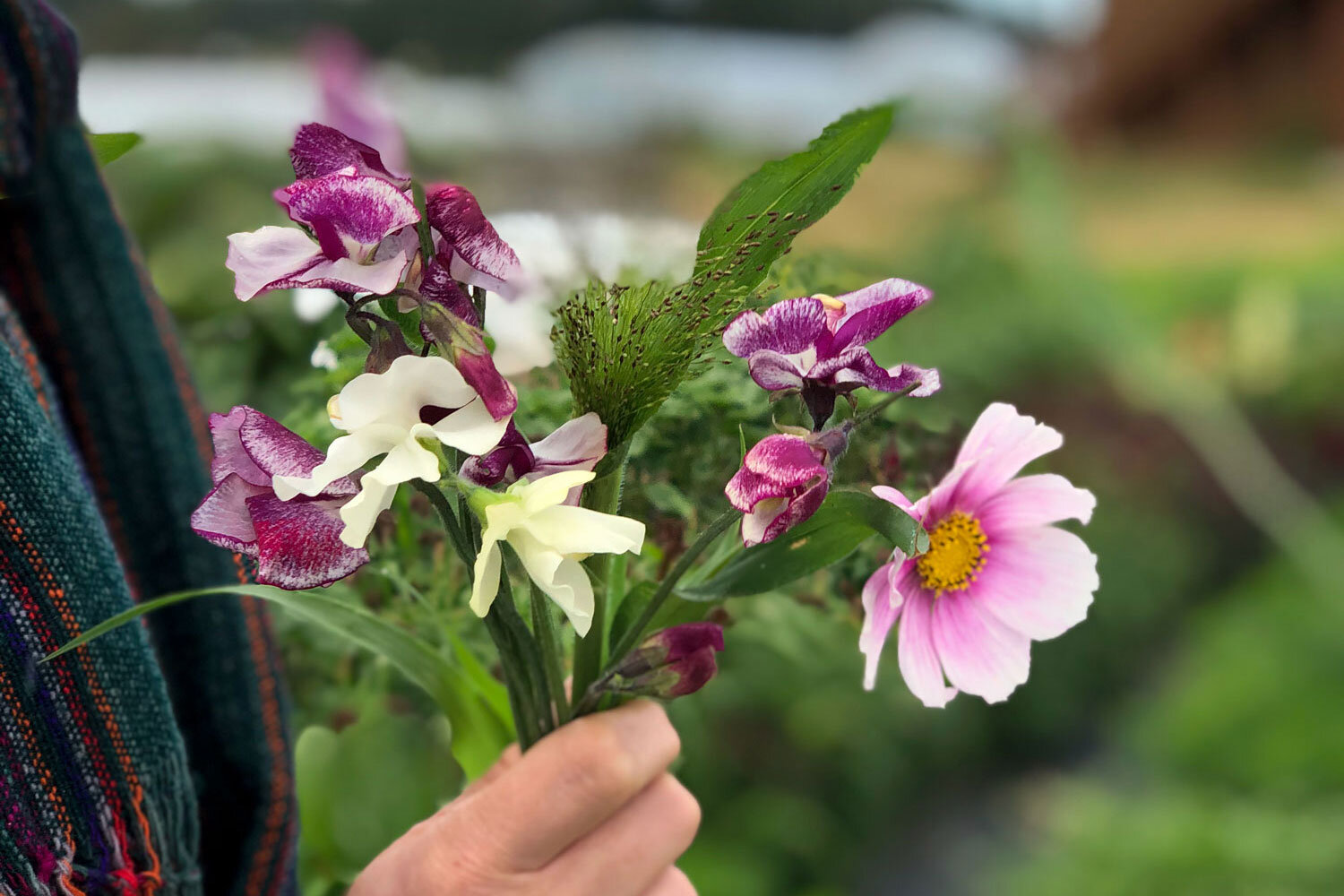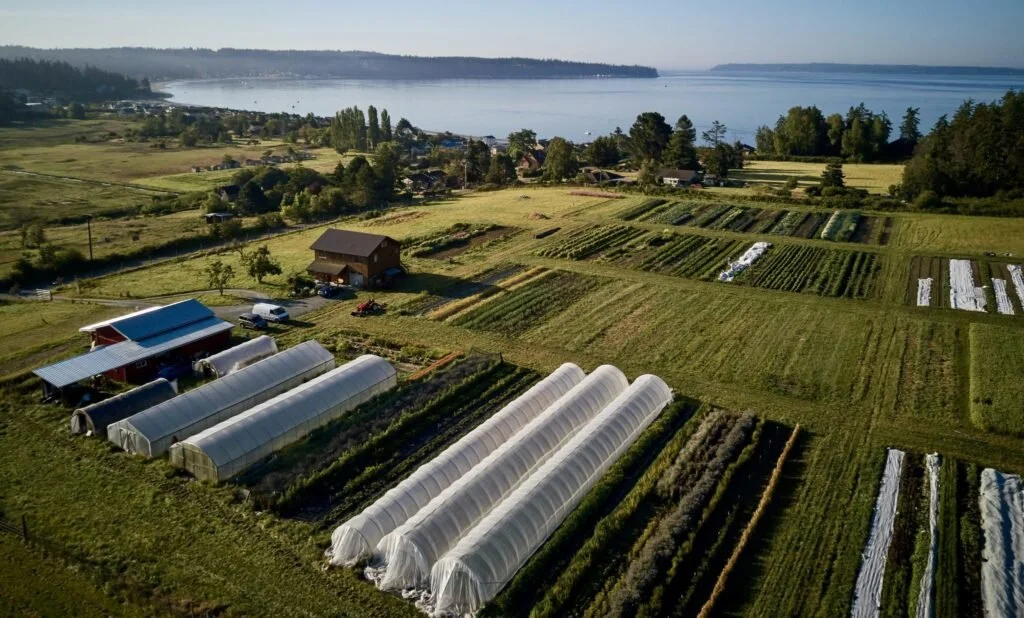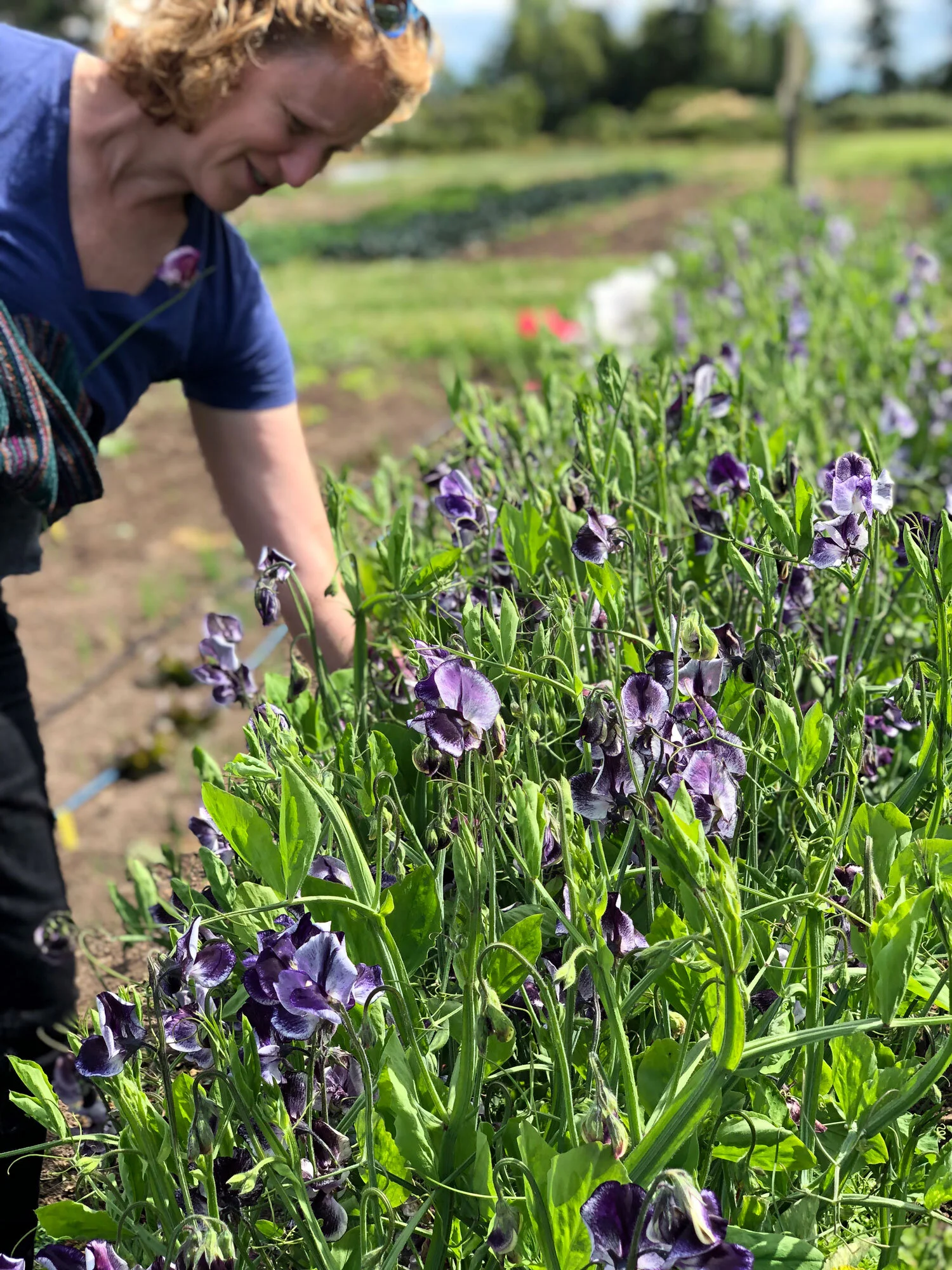Deep Harvest Farm Tour
How many times have you thought about what’s really in a seed packet?
Seeds, of course, but beyond that… What goes into creating that seed packet? Did the seeds come from a plant grown in the PNW or from somewhere else in the country? From a small farm or a large-scale growing operation? How long did it take for the plant to flower and produce seeds? How easy was it to harvest the seeds? Was it grown organically?
At Swansons, we’re always pondering questions like this to make sure that the seeds we offer grow into successful harvests for our customers while also helping to sustain local growers we trust. We can’t carry seeds from every company we admire but we try our best to find a combination of PNW-tested, locally-produced, sustainably-grown seeds.
Deep Harvest Farm is one of the places we know we can find extraordinary seeds. The 10-acre farm on Whidbey Island grows vegetables and flowers that furnish some of the best restaurants on the island and provide 100% organic seeds to local nurseries (Swansons included!) so you can grow PNW-friendly varieties successfully at home.
Our General Manager, Liane, and I had the opportunity to tour their gorgeous farm and we want to share it with you. We think it’s special and we know you will, too!
Annie Jesperson and Nathaniel Talbot, owners of Deep Harvest Farm on Whidbey Island
The owners of Deep Harvest Farm, Annie and Nathaniel, first came to Whidbey in 2010 for a hands-on farm training program and fell in love with the area. After a long search for just the right land, they found this spot in Freeland, overlooking beautiful Mutiny Bay. In 2015, they purchased the land and began to create the diverse farm of their dreams.
““We’re so grateful to have been able to build a home, barn, and greenhouses; and plant hedgerows, fruit trees, and perennials on a plot that is well suited for decades of farming. For us, the farm life is the good life and we couldn’t be happier to provide organic seeds, produce, and flowers for our supportive and beloved community.”
Aerial photo of Deep Harvest Farm overlooking Mutiny Bay
It’s a gorgeous, open space that feels like just the right combination of wild and cultivated. When we visited on a breezy June day, clouds that had been gathering across the bright blue sky, threatening imminent showers, started to dissipate as if ushering us in for our tour. We didn’t mind the clouds - it just added to the PNW island mystic! - but we were grateful to tour the farm under blue skies and to stay dry.
Greenhouses and the barn
Deep Harvest Farm is passionate about organic growing methods, encouraging their plants to grow in soil fed naturally by compost, green manure, and organic-based fertilizer, and without the use of synthetic pesticides and herbicides. Every year, they test different varieties to assess which ones thrive in the soils and climate of the Pacific Northwest. This means that the seeds you buy will grow successfully in your garden. It also means that diverse plant varieties will continue to be grown and passed down so we don’t lose the biodiversity that is so essential to the world.
““We believe that small, regional seed companies and seed savers that offer and share diverse, open-pollinated crops play a crucial role in building a healthy, dynamic seed system. We are honored to be part of the movement that seeks to put seeds back into the hands of growers.”
Tractor and supplies
Nathaniel and Annie took us on a tour of the farm, beginning with the extensive vegetable beds, where actively growing veggies like potatoes and kale mingled with crops of brassicas in flower, waiting for seed collection later in the season. Because seed crops must keep growing longer to reach the seed stage - a full growing season for annuals and well over a year for certain biennial crops - they must endure a longer onslaught of pests and diseases and they demand more nutrients. All this without the aid of chemicals, which results in vigorous plants well adapted to the PNW.
““We want to be part of a food system that prioritizes healthy soils and ecosystems, and where crops can grow vigorous without the support of chemicals. It’s important that our seeds also reflect these values.”
Rows of kale, including ‘Lacinato’ (aka dinosaur kale) seen in the foreground of the photo.
Potato plants beginning to bloom
Arugula in bloom
Rows of Brassica flowers
Rows of potato plants
We visited the greenhouses, where tomatoes, squash, and basil grew cozily (it is the PNW, after all, and heat-loving vegetables appreciate a toasty greenhouse all summer long). Squash and tomatoes are trained up vertical to maximize space and provide the plants with good air circulation, which helps avoid disease.
Zucchini squash
Nathaniel
Annie
Squash trained up vertical supports
After the tour of the greenhouses and vegetable beds, Annie led us to the impressive organic flower garden, one of Annie’s personal projects. Filled with early-summer flowers like cosmos, calendula, and sweet peas, the beds overflowed with color and fragrance. The farm offers fresh-picked bouquets in their local CSA boxes and also provide wedding arrangements!
Impromptu hand-picked bouquet
Honeywort (Cerinthe major v. purpurascens)
An abundance of "‘April in Paris’ sweet pea flowers
Liane picking bicolor purple and lavender ‘Nimbus’ sweet peas
A row of brightly colored poppies and nasturtium
Within and beyond the confines of the flower garden, there is an abundance of flowers planted throughout the farm, enticing pollinators and other beneficial insects to visit different areas. In all, Deep Harvest Farm grows over 30 different flower varieties and colors.
Bachelor’s buttons and bunny tails (Lagurus ovatus) in the breeze
Phacelia in bloom
Calendula and a view of the barn and house
Sweet peas with the house and barn in the distance
Annie and Nathaniel were so welcoming to us, graciously explaining the workings of the farm and showing us new varieties of vegetables and flowers that will be available to purchase as seeds to offer at Swansons. We can’t wait to return one day soon and see how the farm continues to evolve.
Be sure to check out Deep Harvest seeds when you visit Swansons! Our full selection should arrive in mid-January. I know I’m dreaming of the veggies and flowers I’ll be adding to my backyard garden this spring thanks to Annie and Nathaniel’s efforts!
Happy gardening everyone!
Text and photos by Aimée Damman
























